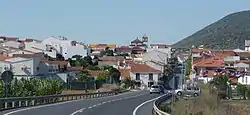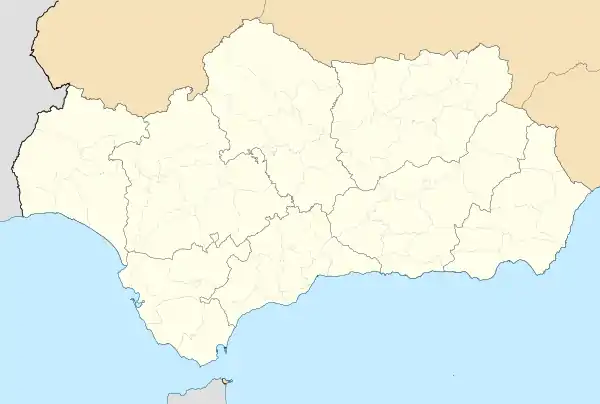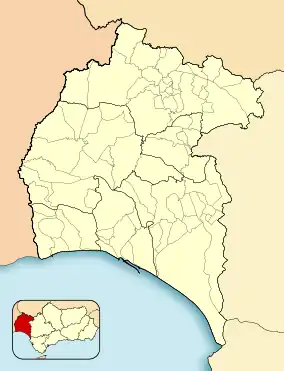Rosal de la Frontera | |
|---|---|
 | |
 Flag  Coat of arms | |
 Rosal de la Frontera  Rosal de la Frontera  Rosal de la Frontera | |
| Coordinates: 37°58′7″N 7°13′11″W / 37.96861°N 7.21972°W | |
| Country | Spain |
| Autonomous community | Andalusia |
| Province | Huelva |
| Area | |
| • Total | 210 km2 (80 sq mi) |
| Elevation | 219 m (719 ft) |
| Population (2018)[1] | |
| • Total | 1,707 |
| • Density | 8.1/km2 (21/sq mi) |
| Time zone | UTC+1 (CET) |
| • Summer (DST) | UTC+2 (CEST) |
Rosal de la Frontera is a municipality of Spain located in the province of Huelva, Andalusia. According to the 2008 census, the municipality had a population of 1846 inhabitants.
Geography
Location
Located in the south-west of the Iberian Peninsula, the village lies at about 219 m above sea level,[2] near the right bank of the Chanza River. The N-433 national road cuts across the municipality and the village, connecting the latter with the Portuguese border (which is barely 3.8 km to the West)[3] and, a bit farther, the Portuguese freguesia of Vila Verde de Ficalho.[4]
History
Precedents
The area of the Chanza riverbanks was already inhabited in the Neolithic and there is a megalithic stone circle known as "Pasada del Abad" near the village of Rosal, and within the municipal limits.[5][6]
As the Portuguese Restoration War broke out, many small settlements near the border depopulated, with the inhabitants withdrawing to the bigger villages, eventually leaving the rest of the territory open to smuggling and banditry.[7] The hamlet of El Gallego was forsaken in 1642.[8]
Repopulation
Part of the efforts for the repopulation of Sierra Morena, from a legal standpoint the creation of Rosal steems from the 1822 Decree on the Repopulation of Large Territories and the granting of those powers to provincial deputations.[9] The creation of Rosal was authorized in August 1834, soon after the death of Ferdinand VII.[9] The first instructions for repopulation were issued in 1838 and by 1844 the village already had an Ayuntamiento.[10] Originally known as Rosal de Cristina, the municipality was renamed as Rosal de la Frontera as result of the new political environment created after the 1868 Glorious Revolution.[11]
References
- Citations
- ↑ Municipal Register of Spain 2018. National Statistics Institute.
- ↑ "Predicción por municipios. Rosal de la Frontera (Huelva)". AEMET. Retrieved 8 April 2021.
- ↑ "Red Provincial de Carreteras de Andalucía. Listados de carreteras" (PDF). Junta de Andalucía. December 2015. p. 36.
- ↑ Alonso de la Torre, J.R. (4 April 2017). "La ruta de Miguel Hernández". Hoy.
- ↑ Linares Catela 2012, p. 22.
- ↑ "Paisaje de la Dehesa del Chanza (Huelva)" (PDF). Instituto Andaluz de Patrimonio Histórico.
- ↑ Cortés Ballesteros 1995, p. 322.
- ↑ Cortés Ballesteros 1995, p. 319.
- 1 2 Cortés Ballesteros 1995, p. 324.
- ↑ Cortés Ballesteros 1995, pp. 324–325.
- ↑ Benito Arranz & Vega Benayas 2003, p. 24.
- Bibliography
- Benito Arranz, Juan; Vega Benayas, Sofía de la (2003). "Consideraciones geográficas sobre la superficie de los municipios de Andalucía". Espacio y Tiempo: Revista de Ciencias Humanas (17): 9–28. ISSN 1885-0138.
- Cortés Ballesteros, Manuel Antonio (1995). "Rosal de la Frontera (Huelva). Un fruto tardío de la utopía ilustrada" (PDF). Espacio Tiempo y Forma. Serie IV, Historia Moderna. Madrid: Universidad Nacional de Educación a Distancia (8): 319–330. ISSN 1131-768X.
- Linares Catela, José Antonio (2012). El Megalitismo en la provincia de Huelva (PDF). Seville: Consejería de Cultura y Deporte. Junta de Andalucía. ISBN 978-84-9959-127-8.